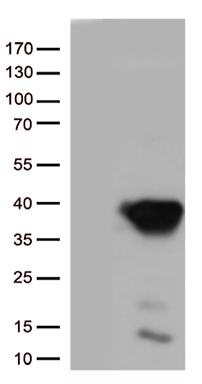Caspase 3 (CASP3) Mouse Monoclonal Antibody (HRP conjugated) [Clone ID: OTI3A11]
Other products for "CASP3"
Specifications
| Product Data | |
| Clone Name | OTI3A11 |
| Applications | WB |
| Recommended Dilution | WB 1:500 |
| Reactivities | Human, Mouse, Rat |
| Host | Mouse |
| Isotype | IgG1 |
| Clonality | Monoclonal |
| Immunogen | Human recombinant protein fragment corresponding to amino acids 29-219 of human CASP3 (NP_116786) produced in E.coli. |
| Formulation | PBS (PH 7.3) containing 1% BSA, 50% glycerol and 0.02% sodium azide. |
| Concentration | 0.5 mg/ml |
| Purification | Purified from mouse ascites fluids or tissue culture supernatant by affinity chromatography (protein A/G) |
| Conjugation | HRP |
| Storage | Store at -20°C as received. |
| Stability | Stable for 12 months from date of receipt. |
| Predicted Protein Size | 31.4 kDa |
| Gene Name | caspase 3 |
| Database Link | |
| Background | This gene encodes a protein which is a member of the cysteine-aspartic acid protease (caspase) family. Sequential activation of caspases plays a central role in the execution-phase of cell apoptosis. Caspases exist as inactive proenzymes which undergo proteolytic processing at conserved aspartic residues to produce two subunits, large and small, that dimerize to form the active enzyme. This protein cleaves and activates caspases 6, 7 and 9, and the protein itself is processed by caspases 8, 9 and 10. It is the predominant caspase involved in the cleavage of amyloid-beta 4A precursor protein, which is associated with neuronal death in Alzheimer's disease. Alternative splicing of this gene results in two transcript variants that encode the same protein. [provided by RefSeq, Jul 2008] |
| Synonyms | CPP32; CPP32B; SCA-1 |
| Reference Data | |
| Protein Families | Druggable Genome, ES Cell Differentiation/IPS, Protease |
| Protein Pathways | Alzheimer's disease, Amyotrophic lateral sclerosis (ALS), Apoptosis, Colorectal cancer, Epithelial cell signaling in Helicobacter pylori infection, Huntington's disease, MAPK signaling pathway, Natural killer cell mediated cytotoxicity, p53 signaling pathway, Parkinson's disease, Pathways in cancer, Viral myocarditis |
Documents
| Product Manuals |
| FAQs |
| SDS |
{0} Product Review(s)
0 Product Review(s)
Submit review
Be the first one to submit a review
Product Citations
*Delivery time may vary from web posted schedule. Occasional delays may occur due to unforeseen
complexities in the preparation of your product. International customers may expect an additional 1-2 weeks
in shipping.






























































































































































































































































 Germany
Germany
 Japan
Japan
 United Kingdom
United Kingdom
 China
China





